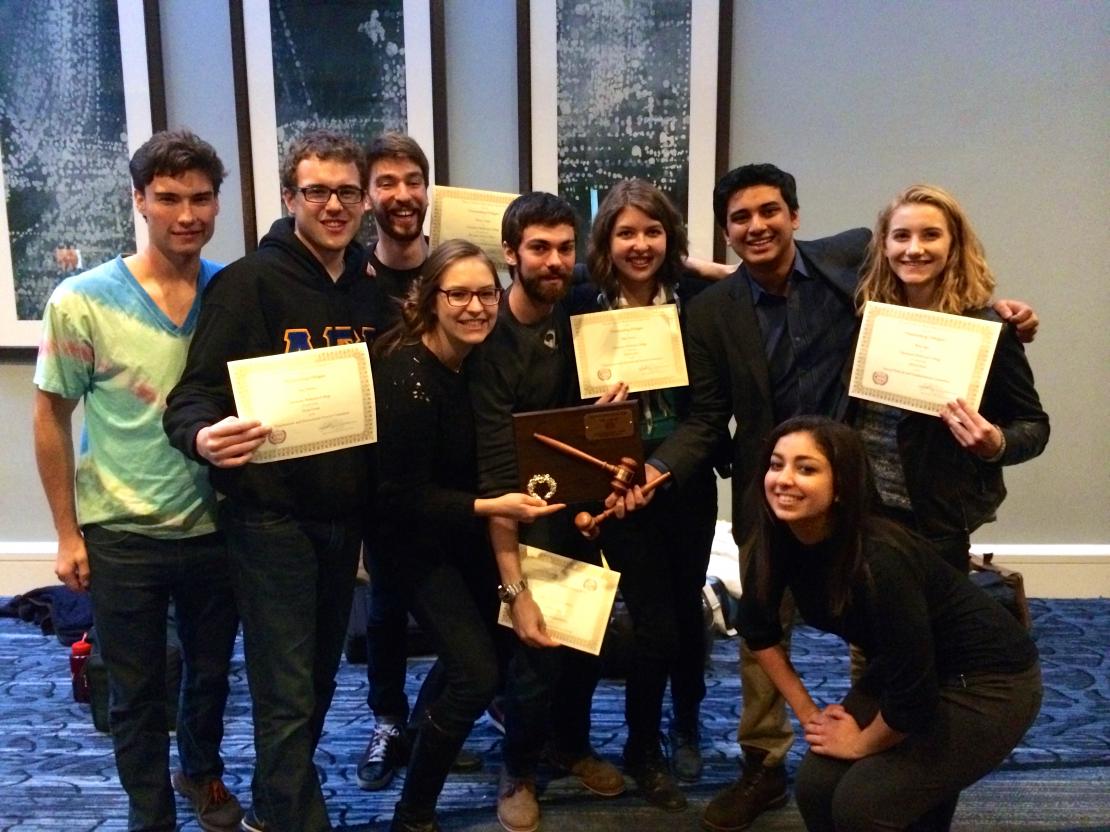The year was 1918. The morning news read, “French Medical Transport Mysteriously Sunk off Spanish Coast!” The room was filled with Allied military and civilian representatives, all scrambling to respond to the latest developments in the war effort. Weary after many all-nighters spent directing the medical response to the Spanish Influenza, the French Premier quickly scribbled a directive to his military command: “Investigate the explosion of the French ship off of…”
“Erase that note!”
I looked up at Sumaer Sandhu ’16, my partner in co-representing France at UCBMUN, Berkeley’s annual Model United Nations conference. He shook his head as he grabbed the note from me and tore it apart.
“I did it,” he said. “I rigged the ship with explosives so that we could make sure to frame Spain and divert some of the heat from everyone’s intelligence services.”
“Why didn’t you warn me?”
“I was getting to it. Coordinating a strategy to oust the Nazis is harder than it looks. And see? Here I am, telling you now.”
Alas, it was too late. The United Kingdom, represented by a Harvard delegate, stood up waving a small piece of paper and exclaimed, “I’ve got it! My agents uncovered the order sent to destroy the French ship!”
My head sunk into my hands. This was it… everything we had been working on for the past two days was about to come crashing down. “Hold on, we’ll be fine,” Sumaer whispered to me as he hurriedly scrawled some irrelevant notes about medical outposts using an unfamiliar, illegible script that I had never seen him use.
“The note isn’t signed, but we can compare it to everyone’s handwriting,” Harvard proclaimed.
Quickly, the committee unanimously voted to force everyone to turn over all notes and directives in the room for inspection. Meanwhile, Sumaer had managed to casually sweep all of his old notes off of the table and into his backpack. After a “thorough” investigation, the committee concluded that the handwriting most closely matched Spain’s. Spain was quickly sanctioned for the remainder of the simulation, and was forced to pay reparations to the French Republic—us.
No one ever managed to suspect the charade that we had constructed, and we ended up winning the committee.
Model UN, much like real life, involves intense negotiation, extensive research, and the ability to make tough decisions. We receive an understanding of global negotiations as an arena where only the tough survive. Soviet Premier Nikita Khrushchev banged one of his shoes on a table to show his country’s defiance, remember?
We also receive an opportunity to build our skills through simulation, in which we apply many of the theoretical lessons we learn in the classroom. Our team is one of the ways that CMC provides me with a practical liberal arts experience.
The skills I’ve learned since joining MUN as a freshman have translated not only into my time in the classroom, but also into other life experiences. MUN skills have helped me on hiking trails, around boardroom tables, and generally in life. At this conference, in particular, I learned the importance of trusting your partner and your team, and I definitely refined my ability to think quickly on my feet. As someone who never did MUN in high school and has never studied international relations, I have learned so much about how the world works on the international stage.
Most important, though, I’ve found a family. Everyone on the Model UN team is one of my closest friends. From the first moment I joined the team I immediately felt surrounded by an amazing group who connected with me, protected me, and valued me. As an underclassman, I spent countless hours asking my more senior friends for advice on classes to register for, professors to take, writing and editing final papers, and particularly how to have fun and get the most out of my many CMC experiences—even those outside of Model UN.
Now an upperclassman, I look forward to practices on Friday evenings because I know that afterwards I’ll get to have a great evening hanging out with so many close friends. From the alumni who’ve graduated to all of the new students who join every year, I would give just about anything for the sense of family and community they have all blessed upon me.
Sakaguchi ’16 is a PPE/Economics-Accounting dual major with the Financial Economics sequence.
